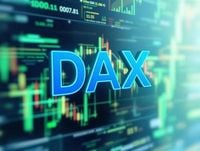Germany's DAX index showed resilience on Wednesday, April 16, 2025, closing slightly higher at 21,311.02 points, a gain of 0.27 percent. This uptick came as speculation grew regarding China’s willingness to engage in talks with the U.S. amid escalating tariff tensions. The positive sentiment was further bolstered by a recovery in U.S. stock markets, notably the Dow Jones Industrial Index, which also experienced a late-session rebound.
The mixed performance of the DAX was a continuation of the previous day's rally, where it had already gained 1.43 percent following indications from U.S. President Donald Trump that he might pause auto tariffs. This optimism was reflected in the automotive sector, with BMW shares rising by 2.16 percent, driving investor spirits higher.
Despite the gains, there were underlying concerns as the ZEW economic sentiment index for Germany plummeted to -14 in April from March's 51.6, significantly below the anticipated 9.5. However, the current conditions indicator improved slightly to -81.2, better than the expected -86.8. These mixed signals are indicative of the uncertainty surrounding Germany's economic outlook, particularly in light of the inconsistent U.S. trade policies.
In terms of wholesale prices, Germany saw a year-over-year increase of 1.3% in March, a slight decline from February’s 1.6%, according to Destatis. This data suggests a softer inflation outlook, as wholesalers often reduce prices when demand weakens, passing cost savings to consumers.
Meanwhile, the broader European market reflected similar mixed sentiments. The MDAX index for mid-sized companies fell by 0.17 percent to 27,219.29 points, while the EuroStoxx 50, the leading index for the eurozone, closed down by 0.08 percent at 4,966.50 points. Analysts are closely monitoring these developments, particularly as ongoing trade negotiations between the U.S. and EU show little sign of progress.
Christophe Barraud, CEO of Market Securities Monaco SAM, commented on the state of U.S.-EU trade talks, stating, "EU expects U.S. tariffs to remain as talks make little progress." He noted that the U.S. has rejected the EU's offer to remove all tariffs on industrial goods, including cars, instead suggesting that some tariffs could be offset by increasing investments and exports.
On the corporate front, shares in Sartorius AG VZO O.N. surged by 10.22%, making it one of the day's biggest gainers. Other notable performers included Commerzbank AG, which added 2.07%, and E.ON SE, up by 1.95%. Conversely, Brenntag AG and Qiagen NV faced declines, falling by 1.75% and 1.33%, respectively.
As the DAX continues to navigate these tumultuous waters, the near-term trajectory appears to hinge on tariff headlines and upcoming U.S. retail sales data. Economists are forecasting a jump of 1.3% in U.S. retail sales for March, a significant increase from February's modest 0.2% rise. A stronger-than-expected report could alleviate recession fears and boost demand for risk assets.
Looking ahead, the DAX futures were reported down 100 points early on April 16, reflecting investor caution in light of President Trump's recent decision to block the export of Nvidia's AI chips to China, a move expected to cost the company $5.5 billion. This decision has raised concerns over the implications for global tech supply chains and trade relations.
In the commodities market, gold prices soared to a new record above $3,275 per ounce, driven by economic uncertainty and a weakening dollar. The dollar index dropped, with EUR/USD reaching a three-year high at 1.1475. Meanwhile, crude oil prices showed some recovery, with Brent and WTI prices rising amid ongoing geopolitical tensions.
With the backdrop of fluctuating economic indicators and trade negotiations, investors are advised to remain vigilant. The upcoming ECB interest rate decision, along with finalized Eurozone inflation figures, will be critical in shaping market expectations. Analysts are particularly focused on whether inflation rates will align closer to the ECB's 2% target, which could signal potential rate cuts.
As markets grapple with the dual pressures of trade tensions and economic data, the atmosphere remains charged with uncertainty. Investors are advised to keep a close watch on developments, as the next few days promise to be pivotal for both the DAX and broader European markets.






